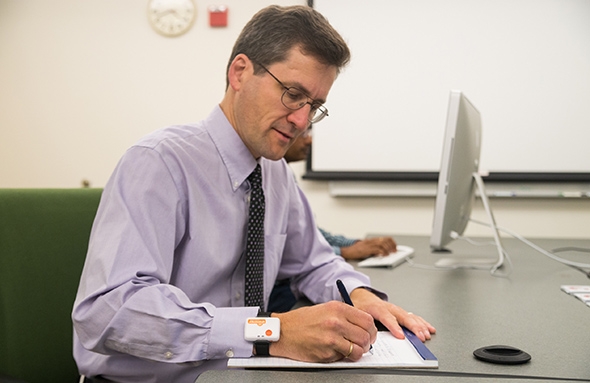With a new $1.5 million grant from the National Science Foundation’s Computer Systems Research Program, researchers from Dartmouth and Clemson University launched the Amulet project to develop computational jewelry to support mobile-health applications.

David Kotz ’86, the Champion International Professor of Computer Science, is principle investigator on the Amulet project. (Photo by Eli Burakian ’00)
“The advent of mobile health (mHealth) technology brings great opportunity to improve quality of life, individual and public health and reduce healthcare costs,” says Dartmouth’s David Kotz ’86, the Champion International Professor of Computer Science, the associate dean for the sciences, and principle investigator on the Amulet project. “Although mHealth devices and applications are proliferating, many challenges remain to provide the necessary usability, manageability, interoperability, availability, security, and privacy.”
The researchers are laying the scientific foundation for secure, privacy-preserving wearable technology. In the process, they are developing a general framework for personal wearable computing, centered on health-monitoring and health-management applications.
“Our vision is that computational jewelry, in a form like a bracelet or pendant, will provide the properties essential for successful body-area mobile health networks,” says Jacob Sorber, formerly a postdoctoral researcher at Dartmouth, and now an assistant professor at Clemson’s School of Computing.
Sorber’s Dartmouth experience and career trajectory emphasizes the importance Dartmouth President Phil Hanlon ’77 is placing on postdoctoral education. In his September 20 inaugural address, Hanlon introduced a new initiative, the Society of Fellows program, designed to bring post docs from all disciplines to campus.
Other Dartmouth faculty involved with the project are Ryan Halter, from Thayer School of Engineering; Sarah Lord, from the Geisel School of Medicine; and postdoctoral fellow Andrés Molina-Markham.
Devices such as the Amulet will complement the capabilities of a smartphone, bridging the gap between the computing possible with a mobile phone and the more complex processing being enabled by wearable computing.
The research is determining the degree to which computational jewelry offers advantages in availability, reliability, security, privacy, and usability, and developing techniques that provide these properties in spite of the severely constrained power resources of wearable jewelry.
“Unlike popular fitness trackers, this wristband talks to your other health and fitness devices, so they know it’s you using them and gives you a quick and easy way to approve the transfer of health information from one device to another or to your health record at your direction, therefore preserving privacy,” says Sorber.
The Amulet will also track the use of medications, send reminders when it’s time for another dose, and provide critical health data to responders if the wearer experiences a medical emergency.
